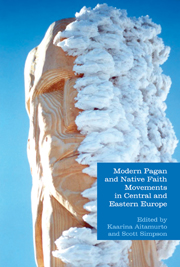Book contents
- Frontmatter
- Contents
- Contributors
- 1 Introduction: Modern Pagan and Native Faith Movements in Central and Eastern Europe
- Part I Overviews
- Part I Country Studies
- 6 Contemporary Paganism in Lithuanian Context: Principal Beliefs and Practices of Romuva
- 7 The Dievturi Movement in Latvia as Invention of Tradition
- 8 Polish Rodzimowierstwo: Strategies for (Re)constructing a Movement
- 9 Ukrainian Paganism and Syncretism: “This Is Indeed Ours!”
- 10 Russian Rodnoverie: Six Portraits of a Movement
- 11 Czech Neopagan Movements and Leaders
- 12 Neopaganism in Slovenia
- 13 Bulgarian Society and the Diversity of Pagan and Neopagan Themes
- 14 Romanian Ethno-Paganism: Discourses of Nationalistic Religion in Virtual Space
- 15 Neopaganism in Hungary: Under the Spell of Roots
- 16 Neopaganism in the Mari El Republic
- 17 A Neopagan Movement in Armenia: The Children of Ara
- Part III Thematic Studies
- Bibliography
- Index
8 - Polish Rodzimowierstwo: Strategies for (Re)constructing a Movement
from Part I - Country Studies
- Frontmatter
- Contents
- Contributors
- 1 Introduction: Modern Pagan and Native Faith Movements in Central and Eastern Europe
- Part I Overviews
- Part I Country Studies
- 6 Contemporary Paganism in Lithuanian Context: Principal Beliefs and Practices of Romuva
- 7 The Dievturi Movement in Latvia as Invention of Tradition
- 8 Polish Rodzimowierstwo: Strategies for (Re)constructing a Movement
- 9 Ukrainian Paganism and Syncretism: “This Is Indeed Ours!”
- 10 Russian Rodnoverie: Six Portraits of a Movement
- 11 Czech Neopagan Movements and Leaders
- 12 Neopaganism in Slovenia
- 13 Bulgarian Society and the Diversity of Pagan and Neopagan Themes
- 14 Romanian Ethno-Paganism: Discourses of Nationalistic Religion in Virtual Space
- 15 Neopaganism in Hungary: Under the Spell of Roots
- 16 Neopaganism in the Mari El Republic
- 17 A Neopagan Movement in Armenia: The Children of Ara
- Part III Thematic Studies
- Bibliography
- Index
Summary
The most numerous and most publicly visible type of Neopagan community active in the Republic of Poland today is a range of autochthonic Slavic Native Faith communities of the sort called Rodzimowierstwo in Polish. There is considerable variation in the application of this term; therefore, for the purposes of this chapter it will be used descriptively to cover those communities in Poland that (1) show a tendency for their members to use the term for themselves, (2) are characterized by attention to multiple aspects of deity (“hard” or “soft” polytheism) which are based in historical Slavic precedents, and (3) attend to well-documented historical and folk sources with a strong commitment to continuity of ethnic and regional tradition.
The individuals who make up these communities are constantly faced with decisions about which strategies they wish to pursue in order to maintain and develop their religious worldview and way of life. This chapter will provide a brief overview of some of the strategies which are available to them in overlapping fields which include the organizational issues of the communities, the development of belief and practice, and their search for a place in society at large.
- Type
- Chapter
- Information
- Publisher: Acumen PublishingPrint publication year: 2013

